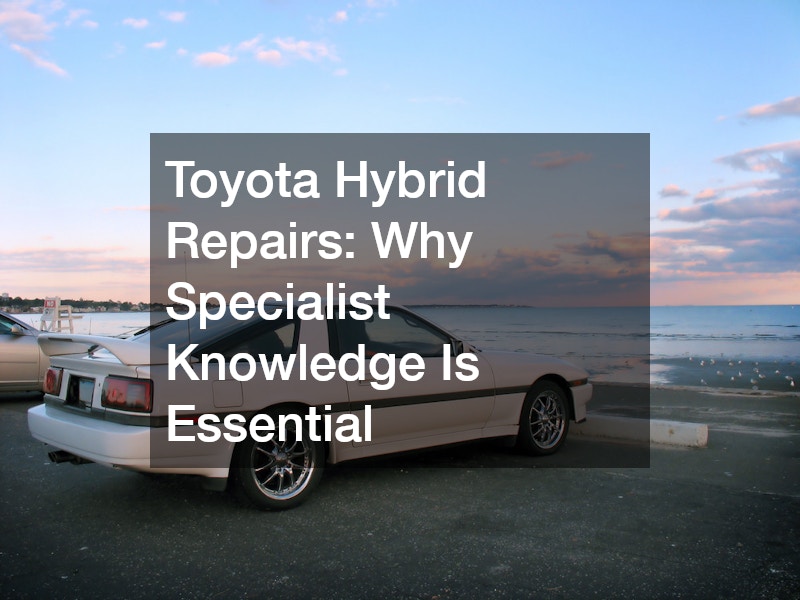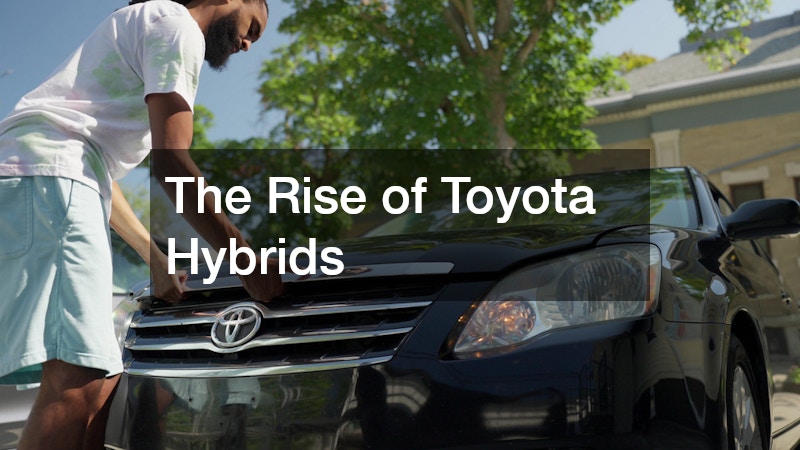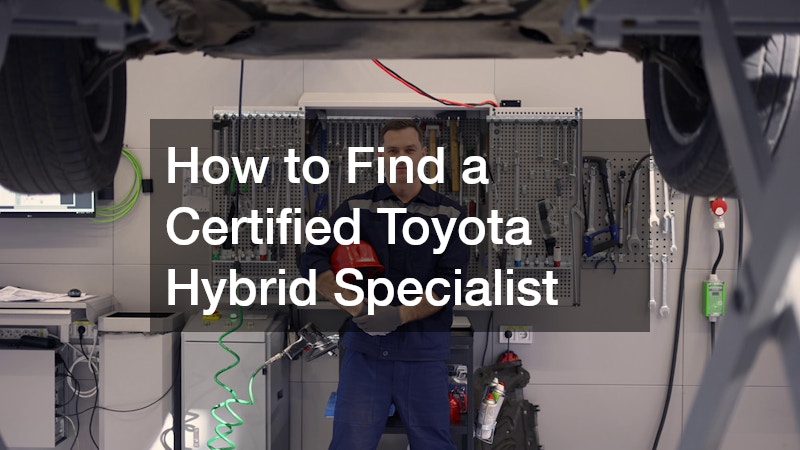Disclaimer: Jeepbastard. This site provides automotive content for informational purposes only.
- Hybrid systems require expert care: Toyota hybrids use complex high-voltage components that demand trained specialists for safe handling and precise repairs.
- Certified Toyota technicians ensure reliability: Visiting a Toyota-certified hybrid mechanic guarantees accurate diagnostics, OEM parts, and proper software updates.
- Generic shops can cause costly mistakes: Non-specialist mechanics may lack the equipment and knowledge to service hybrid batteries and electronics safely.
- Preventive maintenance extends performance: Routine inspections and timely service from hybrid experts preserve fuel efficiency and prolong your vehicle’s lifespan.
- OEM parts matter: Using genuine Toyota components maintains system integrity and prevents compatibility issues with hybrid-specific parts.
- Specialist service protects your investment: Certified hybrid maintenance helps retain resale value while ensuring optimal safety and performance.
Introduction: The Rise of Toyota Hybrids
In recent years, Toyota has become synonymous with hybrid technology. From the iconic Prius to the increasingly popular RAV4 Hybrid, Camry Hybrid, and Highlander Hybrid, these vehicles are celebrated for their fuel efficiency, advanced engineering, and environmental benefits. Hybrid technology combines a traditional internal combustion engine with an electric motor, providing a balance of power and economy that appeals to both eco-conscious and performance-minded drivers.
However, owning a hybrid is not the same as owning a conventional vehicle. While many general auto shops can perform basic maintenance, hybrid systems require specialized knowledge, tools, and training for accurate diagnostics and safe repairs. Whether you’re experiencing battery issues, warning lights, or unusual mechanical behavior, it’s crucial to recommend an experienced auto mechanic for a Toyota who has hybrid-specific expertise. Visiting a certified specialist can save you time, prevent costly mistakes, and protect the long-term health of your vehicle.
This guide explores why specialist knowledge is essential for Toyota hybrid repairs, the risks of relying on generic mechanics, and how to find a trusted, experienced professional to keep your hybrid running at peak performance while maintaining safety, efficiency, and reliability.
Understanding Toyota Hybrid Technology
How Toyota Hybrids Work
Toyota hybrids rely on a combination of systems that work together seamlessly:
- Internal Combustion Engine (ICE): Powers the vehicle traditionally when extra acceleration is needed.
- Electric Motor: Provides supplementary torque and can drive the vehicle at low speeds on electricity alone.
- Hybrid Battery Pack: Stores energy for electric propulsion, often a lithium-ion or nickel-metal hydride battery.
- Regenerative Braking: Captures kinetic energy during braking to recharge the battery.
This intricate system allows hybrids to optimize fuel efficiency while reducing emissions, but it also means that even minor issues can be complex to diagnose and repair.
Unique Systems That Require Specialized Knowledge
Toyota hybrids include components that general mechanics often do not encounter regularly:
- Hybrid Battery Management Systems (BMS): Monitors battery performance and ensures efficient energy usage.
- Electric Motors and Inverters: Convert DC battery power to AC for the motor and vice versa during regenerative braking.
- ECU Software: Multiple computers manage engine, electric motor, and battery operations simultaneously.
Without the proper training and tools, even routine maintenance can become risky or ineffective.
Common Issues in Toyota Hybrids
Battery-Related Problems
- Warning Signs: Reduced fuel efficiency, unusual dashboard alerts, or hybrid system warning lights.
- Causes: Battery degradation over time, exposure to extreme temperatures, or charging system issues.
- Repair Considerations: Hybrid batteries are expensive and sensitive; improper handling can lead to further damage or safety hazards.
Electrical and Software Malfunctions
- Malfunctioning inverters, converters, or controllers can trigger warning lights.
- General OBD-II scanners may read generic codes, but a Toyota specialist using Techstream software can pinpoint the exact problem.
Mechanical and Engine Challenges
- Cooling systems are critical for both the engine and hybrid components.
- Transmission, timing belts, and water pumps require precise maintenance schedules to prevent cascading failures.
Why General Mechanics May Not Be Sufficient
While ASE-certified mechanics are skilled in standard vehicles, hybrid repairs present unique challenges:
- Limited Access to Tools: General shops often lack Techstream diagnostic tools, essential for reading hybrid-specific codes.
- Safety Risks: High-voltage systems can cause serious injury if mishandled.
- Improper Parts or Fluids: Using non-OEM components can reduce battery life, damage inverters, or void warranties.
- Incomplete Knowledge: Without hybrid-specific training, mechanics may misdiagnose issues, leading to repeated repairs and higher costs.
Visiting a Toyota-certified hybrid specialist ensures accurate, safe, and efficient repairs.
Signs Your Toyota Hybrid Needs a Specialist
1. Warning Lights
- Hybrid System Warning: Indicates issues with battery, inverter, or sensors.
- Check Engine Light: Can be related to hybrid-specific components, not just the engine.
2. Decreased Fuel Efficiency
-
A sudden drop in MPG may suggest battery or energy management issues.
3. Unusual Noises
-
Buzzing, grinding, or whining sounds from the motor or inverter often indicate mechanical or electrical problems.
4. Performance Anomalies
- Hesitation during acceleration or regenerative braking issues.
- Difficulty maintaining smooth transitions between electric and gas power.
Benefits of Choosing a Toyota Hybrid Specialist
- Accurate Diagnostics: Specialists use Techstream software to pinpoint problems efficiently.
- Safety Compliance: Proper handling of high-voltage systems reduces risk of injury or vehicle damage.
- OEM Parts Access: Ensures replacements meet manufacturer standards.
- Extended Vehicle Life: Regular, specialized maintenance prolongs hybrid battery and component lifespan.
- Warranty Protection: Certified repairs preserve Toyota warranties and service agreements.
Preventive Maintenance for Toyota Hybrids
Routine Maintenance
- Oil Changes: Use Toyota-approved synthetic oils at recommended intervals.
- Brake and Tire Inspections: Ensure regenerative braking and traction systems function correctly.
- Fluid Checks: Transmission, coolant, and inverter fluids require specific formulas.
Advanced System Checks
- Battery Health: Specialists monitor battery degradation and balance cells.
- Cooling Systems: Properly maintain cooling for inverter and engine components.
- Software Updates: Keep ECUs current for efficiency and safety.
Seasonal Considerations
- Cold weather can affect battery performance; specialists adjust maintenance for local climate conditions.
- Salt and road debris in winter require undercarriage inspections to prevent corrosion.
Safety Considerations for Hybrid Repairs
- High-Voltage Systems: Mishandling hybrid batteries or inverters can be fatal.
- Training Required: Hybrid technicians undergo specialized safety training before performing repairs.
- DIY Repairs Are Risky: Even simple-looking repairs can compromise safety and performance.
How to Find a Certified Toyota Hybrid Specialist
-
Check Certifications
-
Look for Toyota Master Technician or hybrid-specific credentials.
-
-
Verify Tools
-
Ensure the shop uses Techstream diagnostic software and has OEM-approved equipment.
-
-
Read Reviews
-
Use sites like RepairPal, Yelp, or Google Reviews for hybrid-specific repair experiences.
-
-
Ask Questions
-
Experience with battery replacement, inverter repair, and hybrid software updates.
-
-
Confirm OEM Parts Use
-
Only genuine Toyota parts ensure long-term reliability and warranty compliance.
-
Case Studies / Real-World Examples
Case 1: Prius Battery Replacement
- Generic shop attempted replacement without proper diagnostics → wasted time and cost.
- Certified hybrid specialist used Techstream, diagnosed battery cell imbalance, and replaced only the faulty modules.
Case 2: RAV4 Hybrid Inverter Issue
- Warning lights triggered by inverter malfunction.
- Specialist performed a software calibration and inverter inspection, restoring normal function without battery replacement.
Case 3: Cold-Weather Performance
- Lexus owner noticed poor regenerative braking in Vermont winter.
- Hybrid-certified mechanic updated software and adjusted battery management settings → restored full efficiency.
Cost Considerations
- Hybrid battery replacements: $2,000–$5,000 depending on model.
- Inverter repairs: $800–$1,500 including labor.
- Software updates and minor electrical repairs: $150–$500.
- Specialists save money in the long run by preventing misdiagnoses, repeated repairs, and premature part failure.
Conclusion: Protect Your Toyota Investment
Toyota hybrids represent a significant investment in advanced technology, fuel efficiency, and long-term reliability. Ensuring that your vehicle continues to perform at its best requires more than routine maintenance—it demands specialist knowledge, access to OEM parts, and safe handling of high-voltage systems. A Toyota-certified hybrid specialist is trained to address the unique complexities of hybrid systems, providing peace of mind that your vehicle is in capable hands.
By choosing a certified specialist, you benefit from:
- Accurate diagnostics and software updates: Specialists use Toyota’s Techstream software to detect and address issues that generic shops might miss.
- Proper handling of hybrid batteries, inverters, and motor components: High-voltage systems require precise care to avoid damage or safety risks.
- Extended vehicle lifespan and preserved resale value: Regular, expert maintenance ensures your hybrid operates efficiently for years and maintains its market value.
- Preventive maintenance guidance: Specialists offer tailored recommendations for battery care, cooling systems, and hybrid-specific components.
For those looking to locate trusted service providers, consider using the Toyota Official Service Locator to find certified hybrid technicians in your area. Additionally, the U.S. Department of Energy’s Hybrid Vehicle Repair Guidelines provide authoritative insights on maintaining and repairing hybrid vehicles safely and efficiently.
Ultimately, investing in a Toyota-certified hybrid specialist is an investment in your vehicle’s longevity, performance, and your own peace of mind. With the right expertise and preventive maintenance, your Toyota hybrid can continue delivering peak efficiency, safety, and reliable performance for years to come—allowing you to enjoy the benefits of hybrid technology without compromise
Key Takeaways
-
Toyota hybrids require specialized diagnostics, safety, and repair knowledge.
-
Warning lights, battery issues, and performance anomalies signal the need for a specialist.
-
General mechanics may lack tools, training, and OEM access for hybrid repairs.
-
Certified specialists extend battery life, maintain performance, and protect warranties.
-
Preventive maintenance and professional care are essential for long-term reliability.





